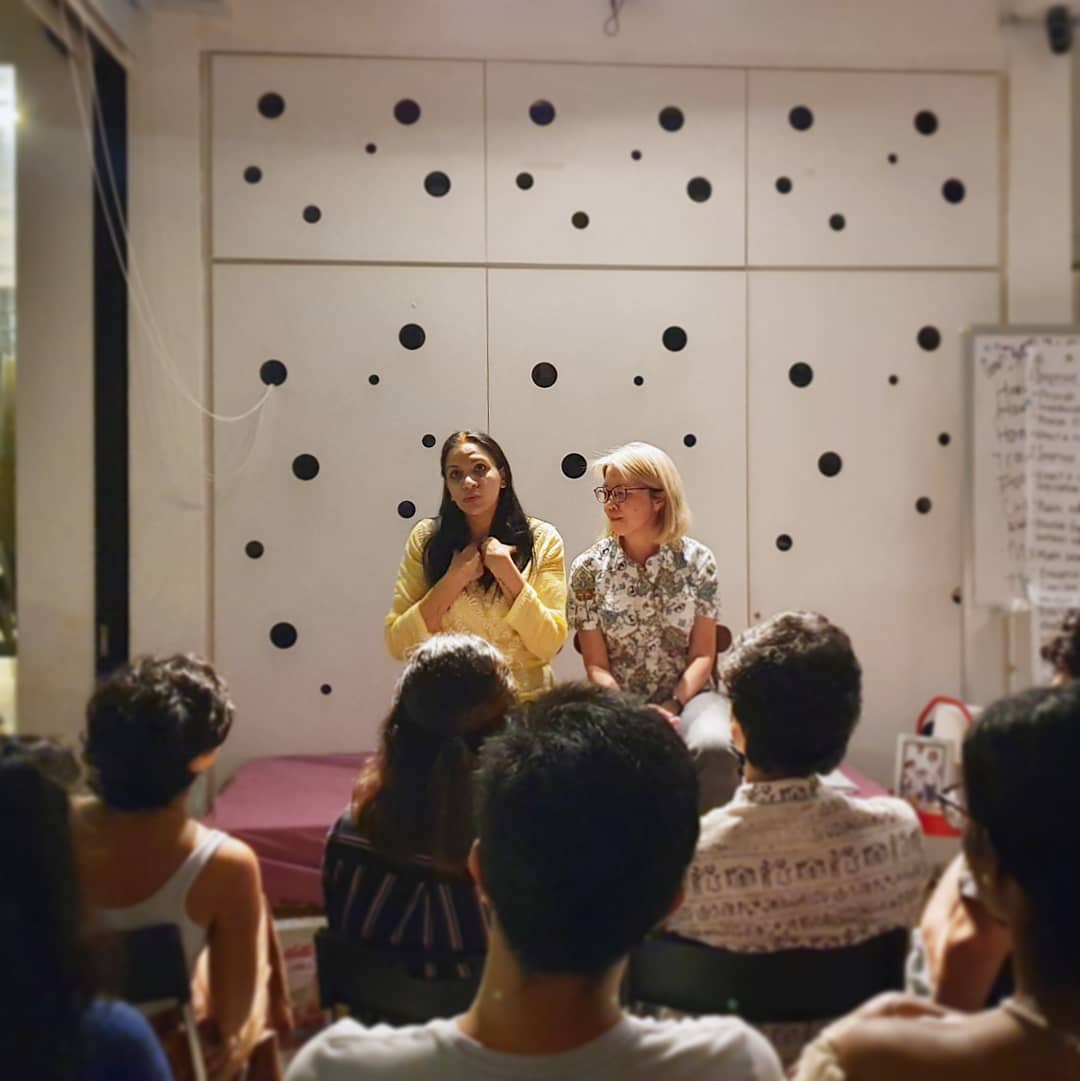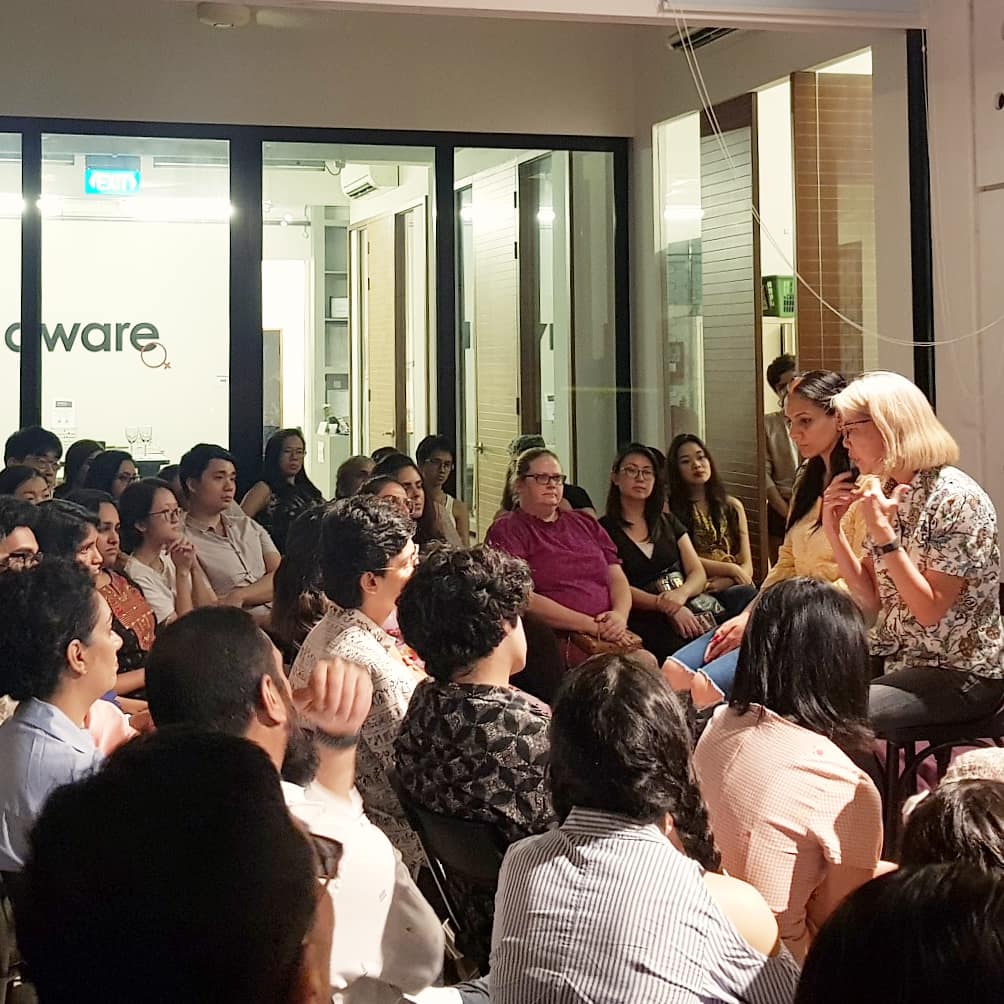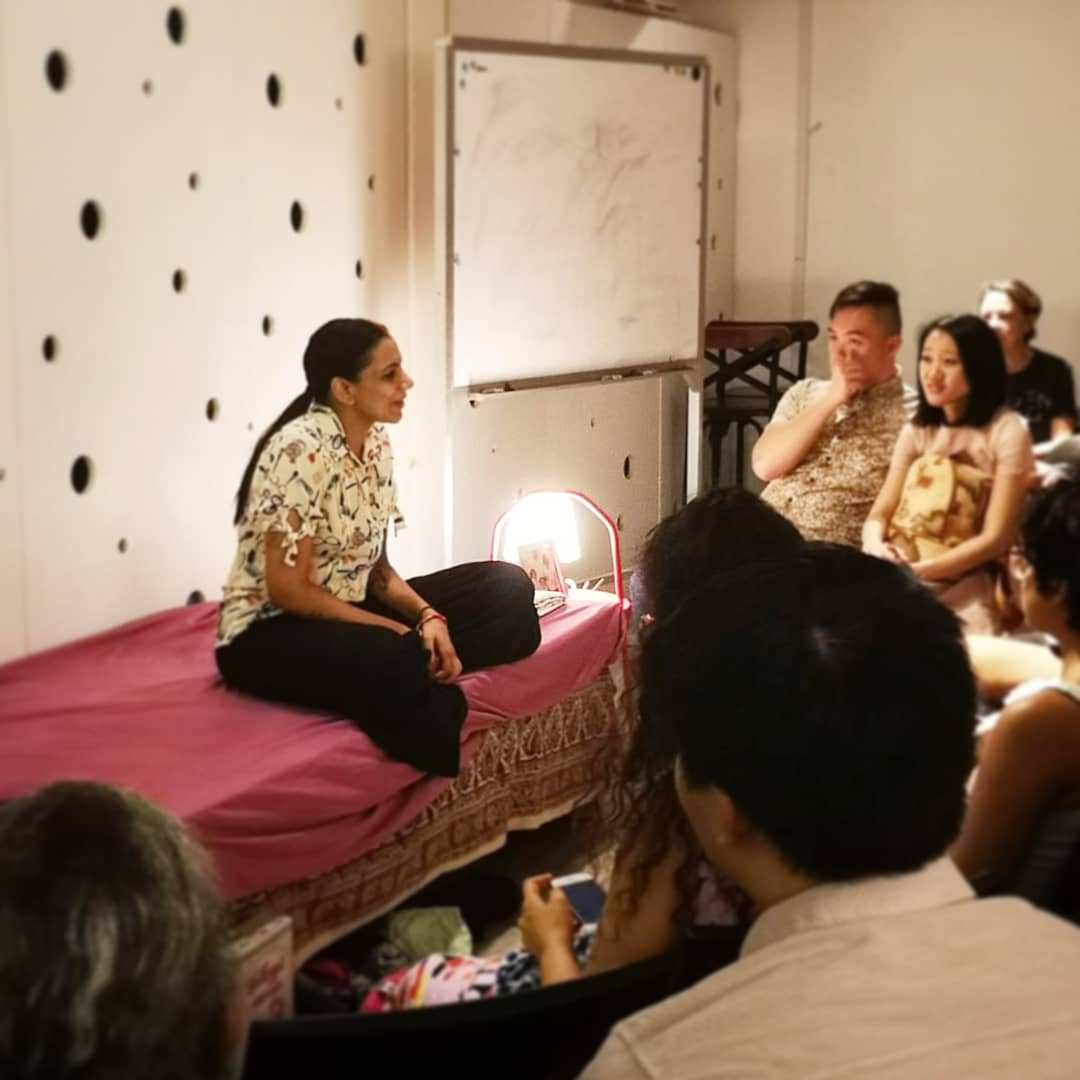-
Advocacy Theme
-
Tags
- Abortion
- Adoption
- Caregiving
- CEDAW
- Disability
- Domestic Violence
- Domestic Workers
- Harassment
- Healthcare
- Housing
- International/Regional Work
- Maintenance
- Media
- Migrant Spouses
- Migrant Workers
- Muslim Law
- National budget
- Parental Leave
- Parenthood
- Polygamy
- Population
- Race and religion
- Sexual Violence
- Sexuality Education
- Single Parents
- Social Support
- Sterilisation
- Women's Charter
A Recap: Sharul Channa’s Crazy Poor Sita, for Stand Together Festival
October 23rd, 2019 | News, Poverty and Inequality
Written by Kaspen Paraskakis Narayan, AWARE intern.
“My name is Sita. I’m a salesperson in ION.”
On the evening of 16 October 2019, AWARE hosted the first of its two performances this month of comedian Sharul Channa’s Crazy Poor Sita.
Adapted from interviews with low-income families and AWARE’s 2018 report “Why Are You Not Working?”, Crazy Poor Sita is a uniquely realistic yet comedic take on the often hidden impoverished side of Singapore. After a hit debut run back in March this year, Sharul brought the production back to AWARE as part of the Stand Together Festival 2019, a collaborative effort by Rice Media and several local NGOs to encourage Singaporeans to fight inequality and poverty together.
Seventy members and friends of AWARE packed cozily into the Centre’s Training Room—the tight confines of which mimicked the limited living space that is often a reality for low-income families in Singapore. At the heart of the room sat Sharul, cross-legged and slumped slightly atop a red mattress. Sharul has gained a following as Singapore’s only full-time female stand-up comedian, with her show Disco Sheela and Other Indian Superwoman breaking ground in 2018. In Crazy Poor Sita, she takes on the distinctive role of Sita, an amalgamation of various women who participated in AWARE’s research.
Apologising for her “bad English”, Sita started off by asking the crowd a few probing questions, such as “Why do you think there are poor people in Singapore?”
As audience members responded, she threw in a few quips, on everything from the differences between HDB and rental flats to the perils of giving children overly optimistic names: “They think if they give good name, children will grow good! My husband is in jail, his name is Ganesh.”
Rueful chuckles filled the room. From there, the rest of Sita’s story unfolded, blunt and engaging—from her childhood of packing chillies all the way to a brief, desperate stint of homelessness in East Coast Park. Having no higher education than secondary school and needing to provide for two children, Sita managed to keep a rental flat through funds provided by the Social Service Office. Getting her job at ION, with the help of non-profit Daughters of Tomorrow, ironically led to even more financial worries, she laments, because her new salary put her in a higher income bracket, and a corresponding government-mandated rent increase.
As Sita’s story drew to a close, she invited audience members to ask questions about her life. A tentative start saw people inquiring about mundane details, such as whether her children still saw her in-laws. Eventually, though, audience members began offering possible solutions to Sita’s various plight: ideas like asking for transport allowance from work, finding a sympathetic coworker, or even starting a business.
As Sharul later commented, this urge to provide answers (even for a fictional character) was a common response to every performance of Crazy Poor Sita. At previous shows, she remembered, some audience members would offer “Sita” money or even their old clothes.
“It’s nice,” she pointed out. “It shows people want to help in Singapore; they just don’t know how.” This, she added, is what makes the post-show discussions such an important part of the performance.

After the audience exhausted their questions for Sita, Sharul quietly exited the stage, to applause. Corinna Lim, executive director of AWARE, took her place. Next to Corinna stood a list of AWARE’s recommendations from the 2018 “Why Are You Not Working?” report, including:
- Providing free childcare services to lower-income households
- Providing flexible childcare arrangements
- Developing a framework on the rights and benefits of casual workers who are not covered under the Employment Act
- Making work pay more
Joined again by Sharul (this time out of character), Corinna opened the night’s discussion by drawing connections between AWARE’s research and Sita’s situation. Referencing the listed recommendations, she emphasised the need in Singapore for not just individual but also “national- and policy-level solutions” to systems that perpetuate inequality.
For example: The process of qualifying for childcare subsidies in Singapore is overly complex and arduous for many mothers. Childcare, Corinna said, was conceived as a mechanism to enable mothers to work. Yet “the problem exists for women in ‘patchy jobs’, for example, such as assisting in a hawker centre.” Without payslips or similar documentation as proof of work, these women are unable to qualify for childcare. This means they don’t have time to find a job, and continue to not qualify for childcare.
“It’s a vicious cycle,” Corinna stressed, “that we need to break by making childcare a right of children. Those below the poverty line should be given childcare for free.”

The audience chimed in with new questions, covering a diverse range of topics: the need for a minimum wage; the intersection of race and poverty; trade union systems in Singapore and abroad; the limitations of the aid MPs can provide; and the responsibility of NGOs and the government to meet the needs of the underprivileged.
To wrap up, Sharul and Corinna reiterated an overarching theme of Crazy Poor Sita: that we can all fight against the stigma and judgment surrounding low-income families. As Corinna put it, “We know they’re doing their best. Every decision they make is to make sure their kids have a good life.”
Want to lend your support to AWARE’s services for and research on low-income women? Sharul and AWARE have set up a Crazy Poor Sita Fund on Giving.sg. We welcome donations from anyone who has caught Sharul’s stirring show, and has been moved to help women like Sita break the poverty cycle.




